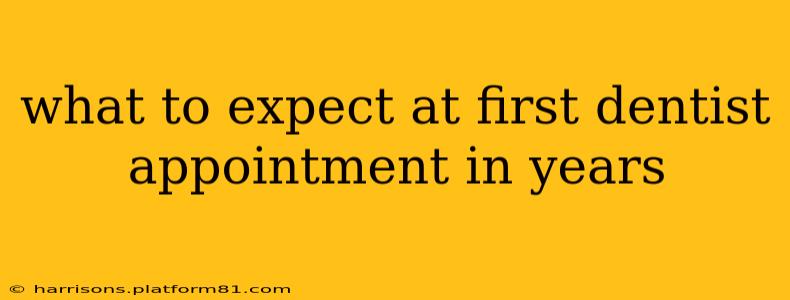It's understandable to feel a bit apprehensive about returning to the dentist after a long break. Many people avoid dental checkups due to anxiety or fear, but regular dental care is crucial for maintaining good oral health. This guide will walk you through what you can typically expect at your first dentist appointment in years, helping to alleviate any anxieties and ensuring a smooth and positive experience.
What Happens During the Initial Consultation?
Your first appointment will likely begin with a thorough consultation. The dentist will want to understand your dental history, including any past treatments, concerns, or medical conditions that might affect your oral health. Be prepared to answer questions about:
- Your dental history: When was your last dental cleaning and checkup? Have you had any previous dental work (fillings, crowns, etc.)? Have you experienced any significant dental problems?
- Your medical history: Certain medical conditions can impact oral health, so the dentist will need to know about any relevant conditions, medications you're taking, and allergies.
- Your oral hygiene routine: How often do you brush and floss? What type of toothpaste and toothbrush do you use? This helps the dentist assess your current oral hygiene practices.
- Your concerns and goals: What are your primary concerns about your teeth and gums? What are your expectations for this appointment? Open communication is key to a successful visit.
Will I Need X-Rays?
Yes, it's highly likely you'll need X-rays. These are essential for the dentist to get a comprehensive view of your teeth and gums, identifying any potential problems that aren't visible during a visual examination. Digital X-rays are generally used now, minimizing radiation exposure.
What About a Dental Cleaning?
A professional cleaning is a standard part of the first appointment after a long absence. The hygienist will remove plaque and tartar buildup from your teeth and gums, polishing your teeth to a smooth finish. They'll also provide instruction and guidance on improving your at-home oral hygiene routine.
What if I Have Dental Anxiety?
Managing dental anxiety is a priority for many dental practices. They understand that fear can be a barrier to care, and they often offer options to make you feel more comfortable, such as:
- Nitrous oxide (laughing gas): This mild sedative can help relax you during the procedure.
- Oral sedation: This involves taking medication before your appointment to reduce anxiety.
- IV sedation: For significant anxiety, IV sedation might be an option.
- Distraction techniques: Some dentists use music, movies, or other distractions to help patients relax.
It's important to discuss your anxieties with the dentist or their staff before the appointment so they can help you develop a plan to manage your fear.
What Kind of Treatment Might I Need?
Depending on the state of your oral health, you may need further treatments beyond a cleaning and exam. This could include:
- Fillings: To repair cavities.
- Crowns or bridges: To restore damaged or missing teeth.
- Root canal therapy: To treat infected tooth pulp.
- Gum disease treatment: To address gingivitis or periodontitis.
- Extractions: If teeth are severely damaged or decayed.
The dentist will provide a detailed treatment plan and discuss the costs involved.
How Much Will It Cost?
Dental costs vary depending on your location, the dentist's fees, and the type of treatment required. It’s advisable to inquire about payment options and insurance coverage during your initial consultation. Many practices offer flexible payment plans or work with various dental insurance providers.
How Often Should I Visit the Dentist After My First Appointment?
Once your initial visit is complete and any necessary treatments are addressed, your dentist will recommend a schedule for routine checkups and cleanings. This is usually every six months, but it might be more or less frequent depending on your individual needs and risk factors.
Remember, proactive dental care is crucial for long-term oral health. Scheduling that first appointment is a significant step towards maintaining a healthy and beautiful smile. Don't hesitate to communicate your concerns and questions with your dentist – they are there to help you.
